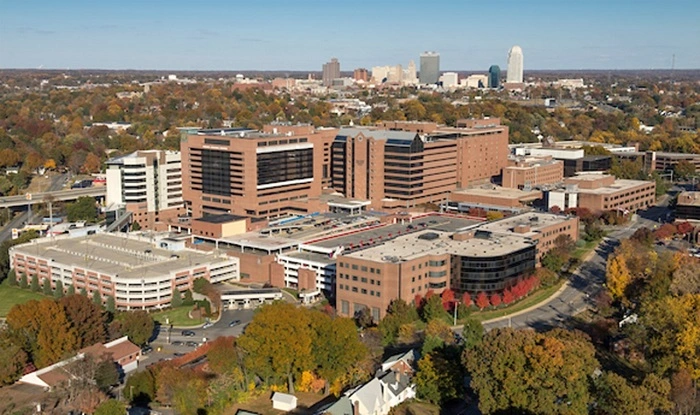Wake Forest School of Medicine is a nationally recognized academic institution committed to excellence in medical education, groundbreaking research, and compassionate patient care. As the educational core of Atrium Health Wake Forest Baptist, it prepares future physicians, scientists, and healthcare leaders to transform lives and improve communities through service, scholarship, and innovation.
An Overview of Wake Forest School of Medicine
Founded in 1902, Wake Forest School of Medicine is located in Winston-Salem, North Carolina. It serves as the medical education and research hub for Atrium Health Wake Forest Baptist and recently became the academic core of the new Atrium Health Academic Learning Health System, which extends its influence across the southeastern United States.
The school is fully accredited and is consistently ranked among the top medical schools in the nation for its programs in primary care, research, and physician assistant education.
Academic Programs at Wake Forest School of Medicine
Doctor of Medicine (MD) Program
The MD program at Wake Forest is designed to train students to be adaptive, empathetic, and forward-thinking clinicians. It features:
- Integrated curriculum combining basic sciences with early clinical exposure
- Personalized learning tracks including health equity, research, and innovation
- Hands-on training beginning in the first year
- Emphasis on team-based, patient-centered care
Physician Assistant (PA) Program
The Wake Forest PA program is one of the most prestigious in the country. It is known for:
- A problem-based learning approach
- Strong clinical rotation opportunities
- High national certification pass rates
Biomedical Sciences Graduate Programs
Wake Forest offers PhD and MS degrees in disciplines like:
- Molecular Medicine and Translational Science
- Integrative Physiology and Pharmacology
- Neuroscience
- Clinical and Population Health
These programs promote research that addresses major health challenges facing today’s society.
Nurse Anesthesia and Other Allied Health Programs
With a focus on advanced clinical skills and leadership, these programs are designed to meet the growing demands of the healthcare workforce.
Innovative Curriculum and Teaching Approach
Wake Forest School of Medicine emphasizes adaptive learning with a curriculum that evolves alongside the medical field. Some standout features include:
The Wake Ready! Curriculum
This competency-based program blends classroom instruction with immersive clinical experiences. It focuses on:
- Critical thinking
- Ethical reasoning
- Cultural competence
- Interprofessional collaboration
Early Clinical Exposure
Students begin interacting with patients from their first year through community-based clinics, simulations, and hospital rounds. This early exposure enhances confidence and practical skills.
Problem-Based Learning (PBL)
Instead of memorizing facts, students work through clinical case scenarios in small groups, encouraging active learning, collaboration, and analytical thinking.
World-Class Research and Innovation
Wake Forest School of Medicine is internationally recognized for its cutting-edge research that translates into real-world solutions. Key research areas include:
Regenerative Medicine
The school houses the Wake Forest Institute for Regenerative Medicine (WFIRM), a pioneer in growing tissues and organs in the lab. Researchers here are developing solutions for organ shortages and traumatic injuries.
Cancer Research
The Comprehensive Cancer Center focuses on early detection, novel therapies, and improving cancer survivorship.
Neuroscience and Aging
With a strong emphasis on Alzheimer’s disease, Parkinson’s, and cognitive decline, Wake Forest is advancing therapies to support healthy aging.
Public Health and Health Equity
Through collaborations with community organizations, researchers address social determinants of health, rural health disparities, and preventive care strategies.
Clinical Training and Hospital Affiliations
Students at Wake Forest School of Medicine benefit from access to a diverse range of clinical environments. They complete rotations at:
- Atrium Health Wake Forest Baptist Medical Center
- Brenner Children’s Hospital
- Community clinics and rural health centers
- Outpatient specialty practices
This variety of settings prepares students for success in any healthcare landscape.
Commitment to Diversity and Inclusion

Wake Forest School of Medicine actively recruits students from all backgrounds and creates a welcoming academic environment that reflects the diversity of the patients they serve. Initiatives include:
- Pipeline programs for underrepresented students
- Support services for first-generation learners
- Cultural competency training integrated into the curriculum
State-of-the-Art Facilities and Resources
The medical school features high-tech learning spaces, including:
- Clinical Skills and Simulation Center: Provides lifelike training scenarios
- Innovation Quarter: A downtown research park where students collaborate on biotech, AI, and entrepreneurship
- Digital libraries and anatomy labs with 3D imaging and virtual dissection tables
Student Life and Support Services
Medical school can be intense, but Wake Forest fosters a supportive and balanced student experience. Highlights include:
- Peer mentoring programs
- Wellness and mental health resources
- Active student organizations and interest groups
- Leadership and volunteering opportunities
Alumni Network and Career Outcomes
Graduates of Wake Forest School of Medicine join a powerful network of alumni in top residency programs and leadership roles across the country. Many alumni return as faculty, mentors, or collaborators in research and clinical care.
A New Era with Atrium Health Partnership
Through its integration with Atrium Health, the school is building a second medical school campus in Charlotte, opening new opportunities for students, research, and community health impact.
This collaboration is expanding the reach of Wake Forest School of Medicine, creating a national model of a Learning Health System, where clinical practice, education, and research continuously inform and improve each other.
FAQs
What is Wake Forest School of Medicine known for?
It is known for innovation in medical education, groundbreaking research in regenerative medicine, and its top-ranked PA and MD programs.
Is Wake Forest School of Medicine hard to get into?
Yes, it is competitive. Successful applicants usually have strong academic records, clinical experience, and community involvement.
Where is Wake Forest School of Medicine located?
It is located in Winston-Salem, North Carolina, with a new campus planned in Charlotte.
Does Wake Forest have a good PA program?
Yes, the Physician Assistant program is nationally ranked and known for its problem-based learning and excellent clinical training.
What is Wake Ready! curriculum?
It’s a modern, integrated approach to medical education that emphasizes early clinical exposure, teamwork, and adaptive learning.









